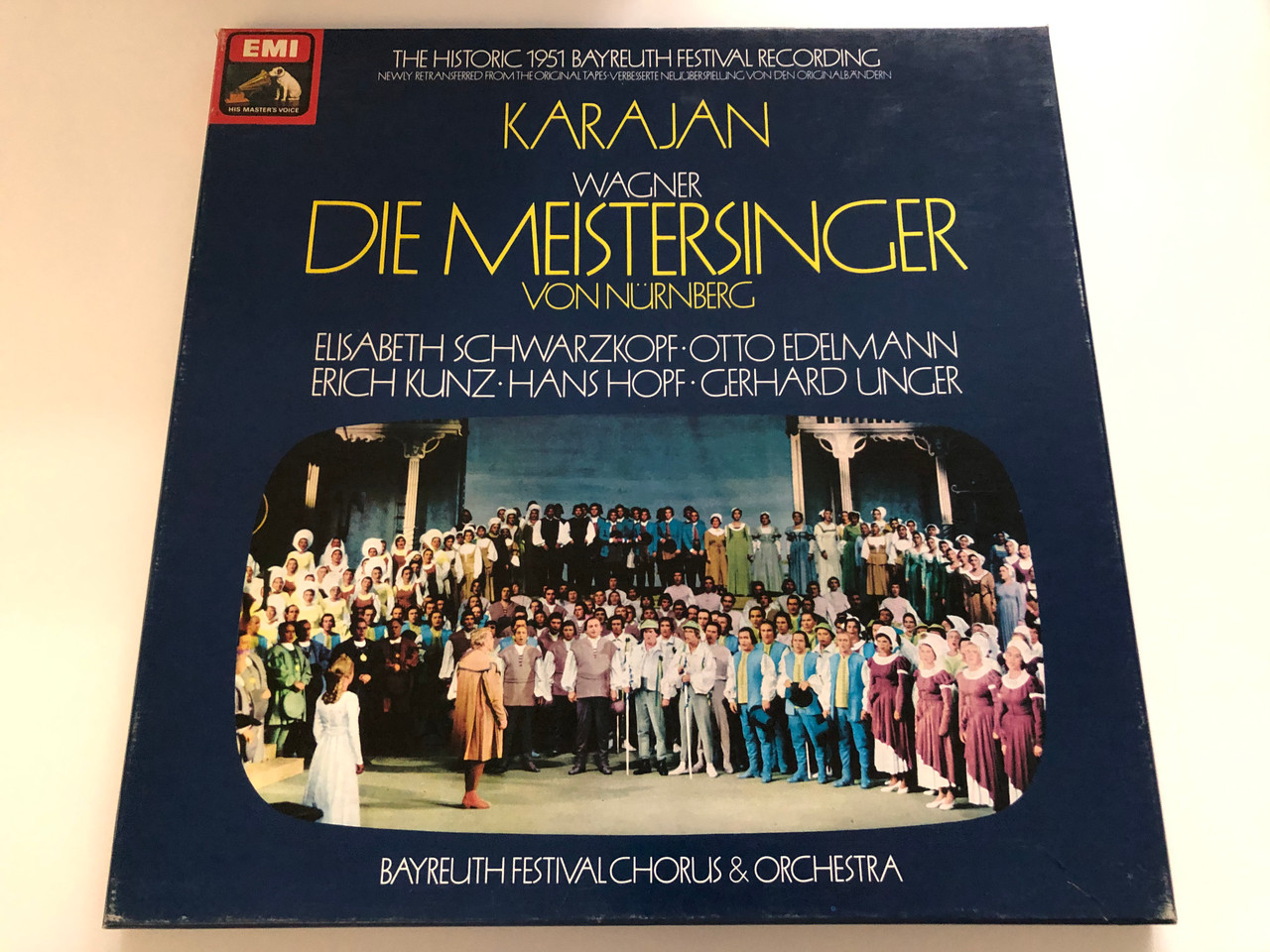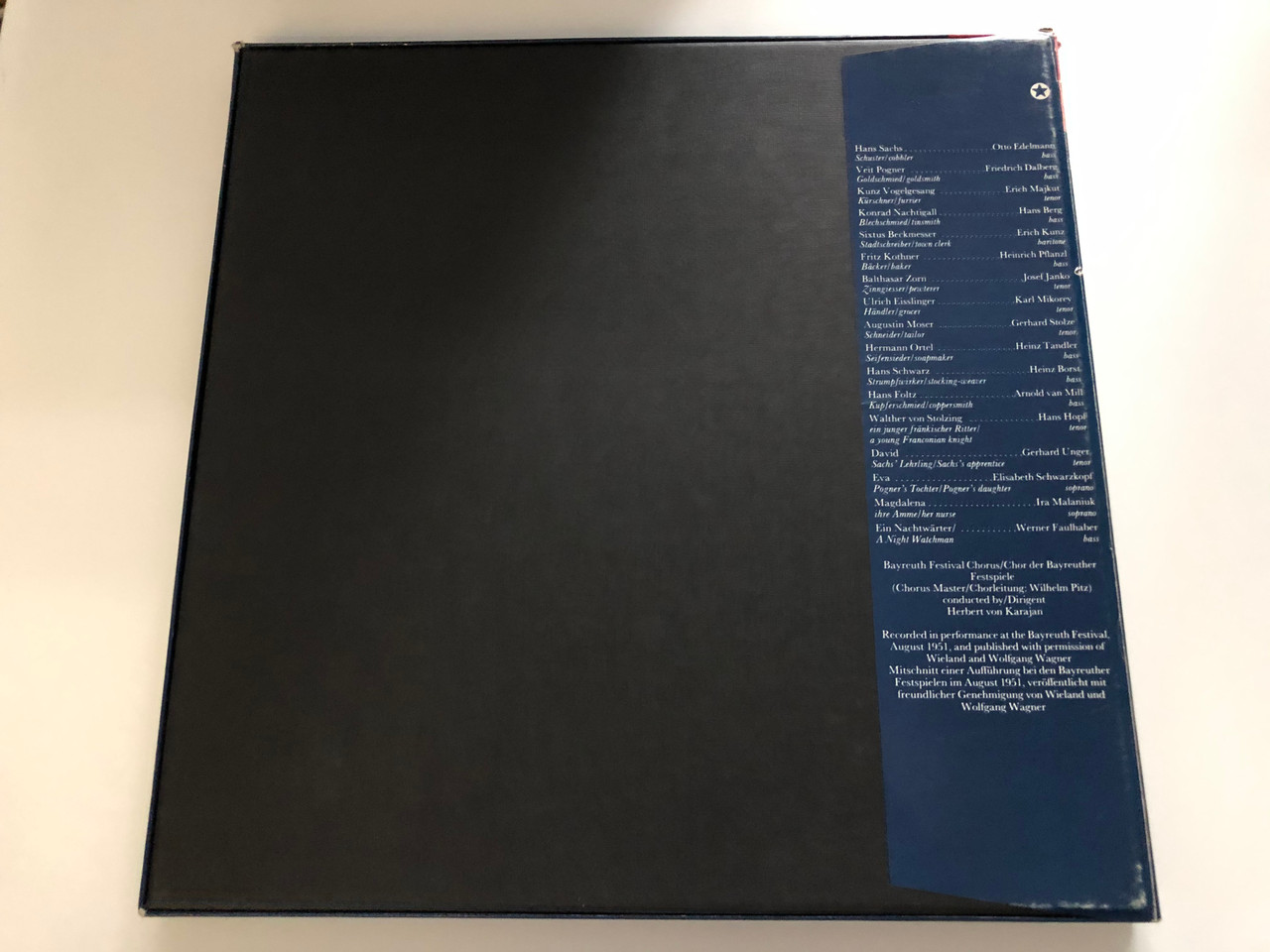Description
Karajan, Wagner, Herbert von: Die Meistersinger Von Nürnberg / Elisabeth Schwarzkopf, Otto Edelmann, Erich Kunz, Hans Hopf, Gerhard Unger / Bayreuth Festival Chorus & Orchestra / EMI Records 5x LP 1952 Mono
RLS 7708
The Historic 1951 Bayreuther Festival
The box contains a 32-page booklet in German and English with photos, biographies and further details as well as a complete libretto
Die Meistersinger von Nürnberg, WWV 96, is a music drama (or opera) in three acts, written and composed by Richard Wagner. It is among the longest operas commonly performed, usually taking around four and a half hours. It was first performed at the National Theatre Munich, today the home of the Bavarian State Opera, in Munich, on 21 June 1868. The conductor at the premiere was Hans von Bülow.
The story is set in Nuremberg in the mid-16th century. At the time, Nuremberg was a free imperial city and one of the centers of the Renaissance in Northern Europe. The story revolves around the city's guild of Meistersinger (Master Singers), an association of amateur poets and musicians who were primarily master craftsmen of various trades. The master singers had developed a craftsmanlike approach to music-making, with an intricate system of rules for composing and performing songs. The work draws much of its atmosphere from its depiction of the Nuremberg of the era and the traditions of the master-singer guild. One of the main characters, the cobbler-poet Hans Sachs, is based on a historical figure, Hans Sachs (1494–1576), the most famous of the master-singers.
Die Meistersinger von Nürnberg occupies a unique place in Wagner's oeuvre. It is the only comedy among his mature operas (he had come to reject his early Das Liebesverbot) and is also unusual among his works in being set in a historically well-defined time and place rather than in a mythical or legendary setting. It is the only mature Wagner opera based on an entirely original story, devised by Wagner himself, and in which no supernatural or magical powers or events are in evidence. It incorporates many of the operatic conventions that Wagner had railed against in his essays on the theory of opera: rhymed verse, arias, choruses, a quintet, and even a ballet.
Tracklist:
| A | Act 1 (Beginning) | |
| B | Act 1 (Continuation) | |
| C | Act 1 (Conclusion) | |
| D | Act 2 (Beginning) | |
| E | Act 2 (Conclusion) | |
| F |
Act 3 (Beginning) | |
| G | Act 3 (Continuation) | |
| H | Act 3 (Continuation) | |
| I | Act 3 (Continuation) | |
| K | Act 3 (Conclusion) |
- Baritone Vocals – Erich Kunz
- Bass – Werner Faulhaber
- Bass Vocals – Arnold van Mill, Friedrich Dalberg, Hans Berg, Heinrich Pflanzl, Heinz Borst, Heinz Tandler, Otto Edelmann
- Chorus – Chor der Bayreuther Festspiele
- Chorus Master – Wilhelm Pitz
- Conductor – Herbert von Karajan
- Orchestra – Orchester der Bayreuther Festspiele
- Soprano Vocals – Elisabeth Schwarzkopf, Ira Malaniuk
- Tenor Vocals – Erich Majkut, Gerhard Stolze, Gerhard Unger, Hans Hopf, Josef Janko, Karl Mikorey
Die Meistersinger von Nürnberg (WWV 96) ist eine Oper bzw. ein Satyrspiel des Komponisten Richard Wagner in drei Akten nach einem von ihm selbst verfassten Libretto. Die Uraufführung fand am 21. Juni 1868 in München statt. Die Spieldauer beträgt rund 4 ½ Stunden.




























